

The Mind is a Metaphor. Date: c. 501 B.C.
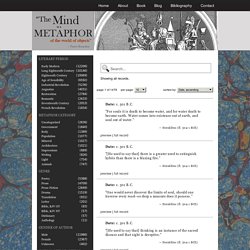
"For souls it is death to become water, and for water death to become earth. Water comes into existence out of earth, and soul out of water. " — Heraklitus (fl. 504-1 BCE) preview | full record "[He used to say that] there is a greater need to extinguish hybris than there is a blazing fire. " preview | full record "One would never discover the limits of soul, should one traverse every road--so deep a measure does it possess. " preview | full record "[He used to say that] thinking is an instance of the sacred disease and that sight is deceptive. " preview | full record "It is difficult to fight with one's heart's desire. Preview | full record. Some thoughts about "gender" in language - and why the tail is wagging the dog. Grammatical Gender versus Natural Gender.
Contrastive Focus Reduplication in English (The Salad-Salad Paper) Because NOUN. « previous post | next post » Lindy West "Are Men Going Extinct?
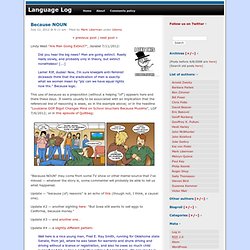
", Jezebel 7/11/2012: Did you hear the big news? Men are going extinct. Really really slowly, and probably only in theory, but extinct nonetheless! 31863. Theta role. Theta roles and thematic relations[edit] The term Theta Role is often used interchangeably with the term thematic relations (particularly in mainstream generative grammar — for an exception see (Carnie 2006)).
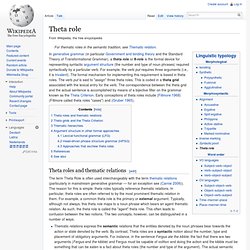
The reason for this is simple: theta roles typically reference thematic relations. In particular, theta roles are often referred to by the most prominent thematic relation in them. For example, a common theta role is the primary or external argument. Typically, although not always, this theta role maps to a noun phrase which bears an agent thematic relation. Thematic relations express the semantic relations that the entities denoted by the noun phrases bear towards the action or state denoted by the verb. One common way of thinking about theta roles is that they are bundles of thematic relations associated with a particular argument position. Thematic relation. Major thematic relations[edit] Here is a list of the major thematic relations.
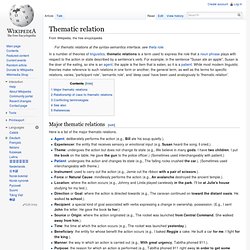
There are no clear boundaries between these relations. For example, in "the hammer broke the window", some linguists treat hammer as an agent, some others as instrument, while some others treat it as a special role different from these. Relationship of case to thematic relations[edit] In many languages, such as Finnish and Hungarian and Turkish, thematic relations may be reflected in the case-marking on the noun. Conflicting terminologies[edit] Thematic relations concern the nature of the relationship between the meaning of the verb and the meaning of the noun.
Presupposition-and-relative-well-formedness-1969-lakoff. Types and Tokens. First published Fri Apr 28, 2006 The distinction between a type and its tokens is a useful metaphysical distinction.
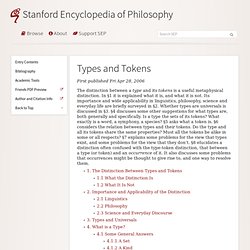
In §1 it is explained what it is, and what it is not. Its importance and wide applicability in linguistics, philosophy, science and everyday life are briefly surveyed in §2. Whether types are universals is discussed in §3. §4 discusses some other suggestions for what types are, both generally and specifically. Is a type the sets of its tokens? 1. Ambiguity. First published Mon May 16, 2011 Fun fact: the word ‘ambiguous’, at least according to the Oxford English Dictionary is ambiguous between two main types of meaning: uncertainty or dubiousness on the one hand and a sign's bearing multiple meanings on the other.
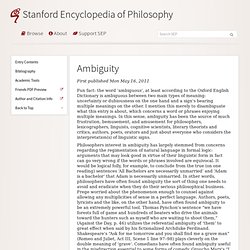
I mention this merely to disambiguate what this entry is about, which concerns a word or phrases enjoying multiple meanings. In this sense, ambiguity has been the source of much frustration, bemusement, and amusement for philosophers, lexicographers, linguists, cognitive scientists, literary theorists and critics, authors, poets, orators and just about everyone who considers the interpretation(s) of linguistic signs. Philosophers interest in ambiguity has largely stemmed from concerns regarding the regimentation of natural language in formal logic: arguments that may look good in virtue of their linguistic form in fact can go very wrong if the words or phrases involved are equivocal. 1. 2. 2.1 Vagueness 2.2 Context Sensitivity 3.
Ambiguity-tests-and-how-to-fail-them. Quantifier-Negative Semantics. Euralex. Geoffrey Nunberg, Xerox Palo Alto Research Center / Stanford University Annie Zaenen, Xerox Palo Alto Research Center / Stanford University Abstract The phenomenon of systematic polysemy offers a fruitful domain for examining the theoretical differences between lexicological and lexicographic approaches to description.
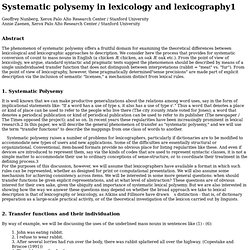
We consider here the process that provides for systematic conversion of count to mass nouns in English (a chicken Æ chicken, an oak Æ oak etc.). From the point of view of lexicology, we argue, standard syntactic and pragmatic tests suggest the phenomenon should be described by means of a single unindividuated transfer function that does not distinguish between interpretations (rabbit = "meat" vs. "fur"). 1. It is well known that we can make productive generalizations about the relations among word uses, say in the form of implicational statements like: "If a word has a use of type s, it also has a use of type s'. " 2. 7. ? 3. There are independent grounds for this analysis.